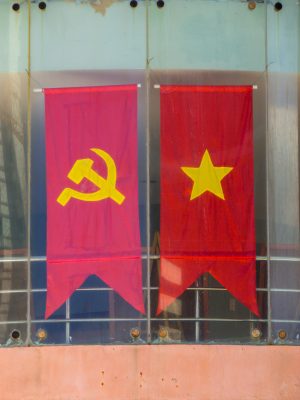Vietnam’s decision to ban the highly anticipated film “Barbie” due to concerns over an alleged “offending image of the nine-dash line” has sent shockwaves through Hollywood and sparked widespread interest among global audiences. Warner Bros., the studio behind the movie, has defended itself by releasing the image in question, describing it as a “child-like crayon drawing” devoid of any political connotations. This begs the question of how the Vietnamese film censoring committee came to perceive this seemingly innocent drawing as China’s contentious “nine-dash line” maritime claim. The answer sheds light on the problematic nature of Vietnam’s system of state censorship and its potential global impact, particularly given the heightened tensions in the South China Sea.
“Barbie” is the latest victim, or wrongdoer, depending on your view, of Vietnam’s stringent system of cultural censorship, which filters out everything perceived to pose a threat to national stability or the image of the ruling Communist Party of Vietnam (CPV). This extends beyond images and information related to the territorial disputes with China, delving into the ruling regime’s historical narrative and the nation’s politics. While media coverage of the “Barbie” imbroglio has mostly focused on the territorial aspect, a more nuanced and complex dynamic is at play.
This is not the first time Vietnam has wielded its cultural censorship apparatus with decisive force. In 2019, the government swiftly pulled the film “Abominable” from theaters after an internet user posted a scene from the movie featuring the “nine-dash line.” The film distributor, CGV Vietnam, faced fines and all related materials, including digital files and posters, were ordered to be destroyed. Government officials were reprimanded for letting the movie bypass inspection, leading to the dismissal of the head of Vietnam’s Cinema Department. Similar actions were taken against the movie “Uncharted” in 2022, as well as other foreign productions like “Pine Gap,” “Madam Secretary,” and “Crazy Rich Asians.”
While many countries in the region have expressed concerns about cultural products promoting China’s unfounded territorial claims, Vietnam stands out as the most vocal and proactive in censoring foreign movies perceived to have capitulated to Chinese demands.
On Vietnamese social media and international platforms, the harsh actions taken by the Vietnamese authority have garnered support. However, these netizens often overlook the underlying impetus behind the country’s swift and assertive banning of films – a motivation that is far from righteous. As a one-party authoritarian regime, censorship lies at the heart of the government’s agenda and serves its interests. With an entire government department dedicated to filtering out sensitive content that could potentially harm the ruling regime, it does not come as a surprise that Vietnam’s ability to react quickly and boldly surpasses that of more democratic neighbors such as the Philippines.
Last year, Vietnam revised its Cinema Law in an attempt to attract foreign film productions to use the country as a shooting location. But the revised law also includes a wide range of grounds on which content can be banned, including any production deemed to contain “reactionary ideas and social evils.” Consequently, any cultural product, no matter how tangentially related to the country’s politics, is vulnerable to prohibition. Such stringent censorship not only stifles freedom of speech within Vietnam but also hampers the creative development of its film industry. Acclaimed Vietnamese movies have been forced to omit scenes deemed unfit by the authorities, and fines have been imposed on internationally recognized films participating in international festivals without government permits, overshadowing the creative and commercial achievements of movies like “Ròm” or “Vị.”
Circling back to the “Barbie” movie, the scene disclosed by Warner Bros. exposes the authorities’ paranoia and a “better safe than sorry” approach to cultural censorship. Bill Hayton, an expert on Vietnam, told The New York Times that despite the harsh actions of the Vietnamese censors, he “really can’t see what the fuss is about.” Hayton suggested that this might have been an attempt by Vietnam’s censors to demonstrate their loyalty and usefulness to the regime.
The censorship of “Barbie” not only highlights the regime’s hyper-paranoia regarding the South China Sea disputes but also reveals a broader implication, namely its potential global influence. The stringent measures taken by Vietnamese authorities have prompted other countries to consider similar actions against “Barbie” and ignited discussions among U.S. lawmakers who are already concerned about China’s influence on Hollywood.
While it is crucial to scrutinize Hollywood productions to prevent the dissemination of illegal territorial claims, it is equally important to exercise caution and resist the temptation to be swayed by the decisions of a heavily censored state. Succumbing to the influence of a regime known for its control over cultural products could set a dangerous precedent, potentially leading to a global wave of censorship that undermines the very foundations of democratic societies.
Balancing the need for responsible oversight with the preservation of democratic values is a delicate task. As discussions unfold, nations must approach the promotion of censorship with meticulous consideration, ensuring that any measures implemented do not inadvertently impede the progress of democracies worldwide.

































